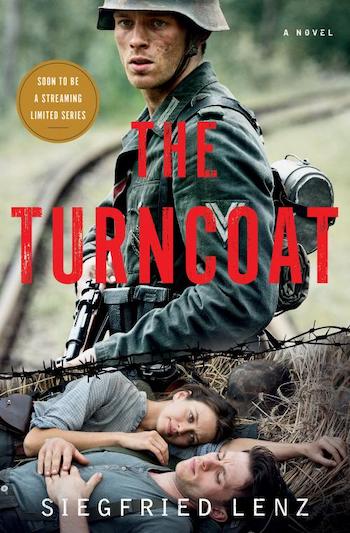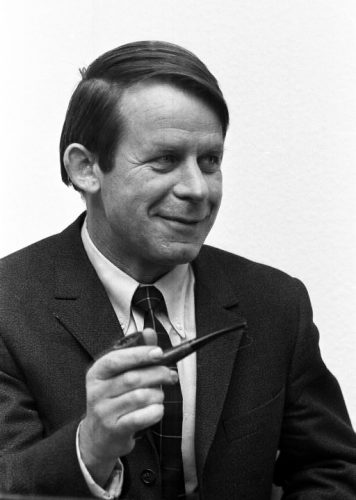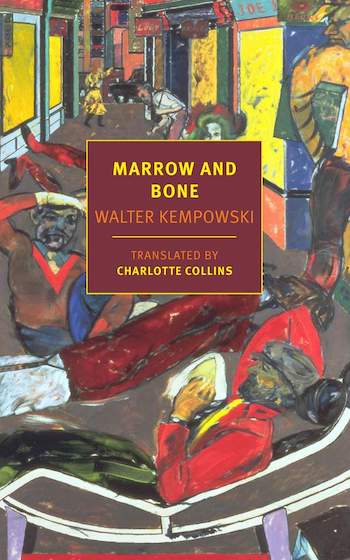Book Review: “The Turncoat” and “Marrow and Bone” — Two Revealing Looks at World War II
By Kai Maristed
For each of these major, prize-honored writers — Siegfried Lenz and Walter Kempowski — birth = destiny = art.
The Turncoat by Siegfried Lenz. Translated from the German by John Cullen. Other Press, 304 pages, $13.99. (pre-order for September publication). Marrow and Bone by Walter Kempowski. Translated from the German by Charlotte Collins. NYRB, 208 pages, $16.95.

Toward the end of Marrow and Bone, Walter Kempowski’s on-the-road protagonist muses, “the only constant in life is chance.” Not very original, perhaps, but apropos to this double book review: because quite by chance (if there is such a thing) your normally wide-ranging reviewer found herself unexpectedly cracking open two newly translated novels that inhabit the same relative backwater — that part of present Poland once known as East Prussia — and share the same historical focus — World War II. Both writers were born there, close in place and time: 1926 and 1929. (And by the way, my father, also born 1926, fought that war on the other side, as a Marine in the Pacific.)
Of course the books, like their authors, have and tell very different stories. While Marrow and Bone was written and published in the liberal-left Germany of 1992, the 1951 manuscript of young Siegfried Lenz’s The Turncoat was excoriated by his publisher as being so politically “dangerous to your career” that it wasn’t unearthed until 2011 by Lenz’s widow and released to posthumous acclaim, bestsellerdom, and a successful film adaptation.
For each of these major, prize-honored writers, birth = destiny = art. Lenz, born in Lyck, East Prussia, was drafted into the German Navy in ’45. He jumped ship in Denmark and interpreted for the British as a prisoner of war. An early essay testifies to his juvenile euphoria of joining the military, the sobering reality of war, and the relief of defeat — the end of the lies. The Turncoat drives these themes into a deeper and darker, fully imagined and absolutely gripping fictional reality, with shattering consequences for the players and puppets of war involved. We follow Walter Proska, a conscript in the Wehrmacht, from his near-demise in a train blown up by Polish partisans, to his reassignment to “the Fortress,” a ramshackle redoubt in the forest run with a spiked-iron fist by the drunken Willi, and populated by a handful of colorful cannon-fodder characters, including a fat cook devoted to Alma, his chicken; a bully who takes his sexual frustration out on young birch trees (oh, yes); and the student Milk Roll, target of the others’ casual sadism, whose whispered philosophies begin to illuminate in Proska’s mind the senseless cruelty of war and the power of the “Gang that rules us.” In other words, Proska is becoming “woke.”
The Wehrmacht has silently withdrawn from the front. Life in the Fortress comes down to boiled cabbage, schnapps, cigs, lice, and the proximity of men and women set on killing you. The danger within (Willi welcomes in a local pastor, then shoots him in the back) is nearly equal to the danger from deadly partisans without.
Alone on patrol Proska reencounters Wanda, a girl whom he has named “Squirrel” for her reddish hair, and who may have set the bombs in the train before she jumped off. Frank yet mysterious, fresh and sexy, she succeeds in temporarily allaying Proska’s suspicions, if not ours. Shortly after their lovemaking he’s wakened from sleep by the approach of a young partisan. Fixing the lad in the cross-hairs of his rifle, he wrestles with himself, cursing the boy for his careless culpability in coming closer, step by step… As Milk Roll says later, “Idle pacifism is an impotent ghost.” To tell more of the story’s gut-wrenching twists would risk spoiling a gripping read.
Remember what it was like, when you were a kid, to lose yourself in a novel, in its voices, odors, landscapes, and desires? Germany shortly after defeat was a mangled, confused, guilt-riven and, for some, bitterly angry society. Still, one can only marvel at that spineless publisher who managed to stifle The Turncoat for over 50 years. He really missed out on something.
Lenz is not a particularly subtle writer. His subject is moral dilemma — the difficulty and loneliness of ethical choice, straight up no chaser. While his short stories and second novel, The German Lesson, were embraced by postwar readers eager for just such hard lessons, and are school standards today, many critics turned up their noses at strong whiffs of a 19th-century style and sensibility. Lenz cited Hemingway and Faulkner as models, but is that not Thomas Mann leaning over his shoulder? From a purist’s point of view, he gets away with murder. Nature and objects are shamelessly personified: “the locomotive was certainly small, but it probably already knew there were better things than work”; “the young forenoon lay innocently upon the marshes, blithe and foolish…”. The final drops of pain and sorrow are wrung from human death and loss with no astringent application of distance or irony. Yet Lenz (masterfully translated by John Cullen, with the sense of dialects intact) gets away with it because he has a hell of a story to tell. And because at each harrowing turn of events the real suspense lies in the question: who is Walter Proska? A loyal friend? Rapist? Killer? Patriot? And because of the tender respect Lenz shows his characters, major and minor, including Wanda, and Thighbone, the crippled fisherman-soldier obsessed by a wily pike in the river, and war’s women without men. Tender toward all but the most evil, that is.

Novelist Siegfried Lenz in 1969. Photo: Wiki Commons.
In The Turncoat a Polish-Russian officer tells a captured German, “As soon as you get beat, you want to be brothers.” In Bone and Marrow, a 43-year-old Hamburg journalist revisits the same blood-soaked East Prussian terroir, now peaceful Communist Poland, thanks to a truly improbable scenario: it’s 1973, and Jonathan is hired by a luxury car maker to take a road trip, chronicling the tourist attractions of a rally route to advertise said car’s virtues. A war orphan raised by a well-off uncle, he is loath to go anywhere near the apocryphal scene of his origins, a church where his mother bled to death in childbirth while fleeing the Russian invasion. But Jonathan is in a relationship to which the word dysfunctional doesn’t begin to do justice. (Her passion as an art curator is collecting depictions of torture, cruelty, sadism etc., get the symbolism? Good, because I didn’t quite.) And besides, “He had studied a wide variety of things: German language and literature, history, psychology and art…. And now here he sat, with his clarity and truth…. What was it good for?”
So it’s off to Danzig and beyond in the fabulous motorcar, a bit like Mr. Toad in The Wind in the Willows. But here the company includes hunky racecar driver Hansi and Frau Winkelvoss — whose function, besides displaying just how annoying well-meaning, loquacious, sexually available German women can be, has something to do with making the “arrangements.”
Not very much happens. It needn’t, necessarily, in a novel bent, on the one hand, on satirizing West Germany’s Wirtschaftswunder materialism and re-established sense of superiority — not that the sly, impoverished and sometimes priapic Poles get off lightly either — and, on the other, illustrating something deep about the reluctant, redemptive effort to turn and face one’s place in history.
Jonathan has a thing for early northern monumental architecture, so they hit the cathedral in Danzig and the Marienburg fortress of the Teutonic Order. Still in Danzig, bored Jonathan roams and gets lost in a warren of alleys, and is taken in for a precious cup of real coffee by a family whose “borderline” daughter languishes on a sofa, in need of Western meds, which Jonathan promises to procure for them. In parting she murmurs, “Who is to blame?” Jonathan is convinced that she means…what, exactly? The war, its aftermath, stupidity, and cruelty? The Holocaust? (A topic everyone here tiptoes around.) The question will haunt Jonathan, who “couldn’t bear this sort of generalization,” although to readers the answer to “who is to blame?” might seem rather obvious.

As they purr deeper into the flat landscape of potato farms, and then surmount the theft of the pricey motor car (really, why didn’t Hansi take the keys with him when they all piled out for a break?), it comes as no surprise that they fetch up “by chance” in Rosenau, where Jonathan’s mother “breathed her last.” There he takes a fall by a stream and is brightly blinded by a concussion. Minutes later he stumbles around the little churchyard. Having lost the prescription, he uses the girl’s empty meds bottle to scoop up some of the soil there — perhaps a bit of his mother remains in it.
For the rest of the trip Jonathan is visited by vivid images of his dead cavalry officer father, waiting in vain on the Vistula Spit for succor from the Fatherland. Back in Hamburg he hurries to his apartment to share his experience with his girlfriend. She, though, has moved in with her wealthy boss, and taken every trace of herself away.
There’s no spoiling in such a summary, because Marrow and Bone doesn’t intend suspense. There is a stasis to this road trip, in part because of Kempowski’s ironic distance from his characters, a stark contrast to Lenz’s investment. And this is strange, because Kempowski, an educator considered something of a German Studs Terkel for his painstaking multivolume collection of first-hand people’s stories, Echo Soundings, spent five years in a postwar Soviet prison, accused (along with his mother) of having passed information to the Americans. He certainly might have written a heart-stopping, autobiographically infused novel in the vein of The Turncoat.
All other things being equal, I prefer fiction that embraces its characters, rather than sets them up as targets. I also wonder what Jonathan’s psychology professor might have had to say about creating a passive alter-ago like Jonathan. Scapegoat for German guilt?
But to each writer his own voice and purpose. Marrow and Bone portrays an aimless, coddled young man, ’70s postwar Germany personified, adrift and then (at least momentarily) found in the still smoking crucible of East Prussia. The pleasure of reading it, in this deft translation by Charlotte Collins, lies less in its metaphors than in its snort-out-loud social satire. As Jonathan recites to himself, “God preserve us from wind and rain/ and Germans going abroad again.” For bad or good, these types and stereotypes still abound, many decades on.
Kai Maristed studied political philosophy in Germany, and now lives in Paris and Massachusetts. She has reviewed for the Los Angeles Times, the New York Times, and other papers. Her books include the short story collection Belong to Me, and Broken Ground, set in Berlin. Recent fiction includes Evangeline, or Theories of Childhood Development, in The Iowa Review, and The Age of Migration, in Ploughshares Magazine. Read Kai’s Paris-centric take on politics and the arts here.
Tagged: Kai Maristed, Marrow and Bone, Sigfried Lenz, The Turncoat, translation
